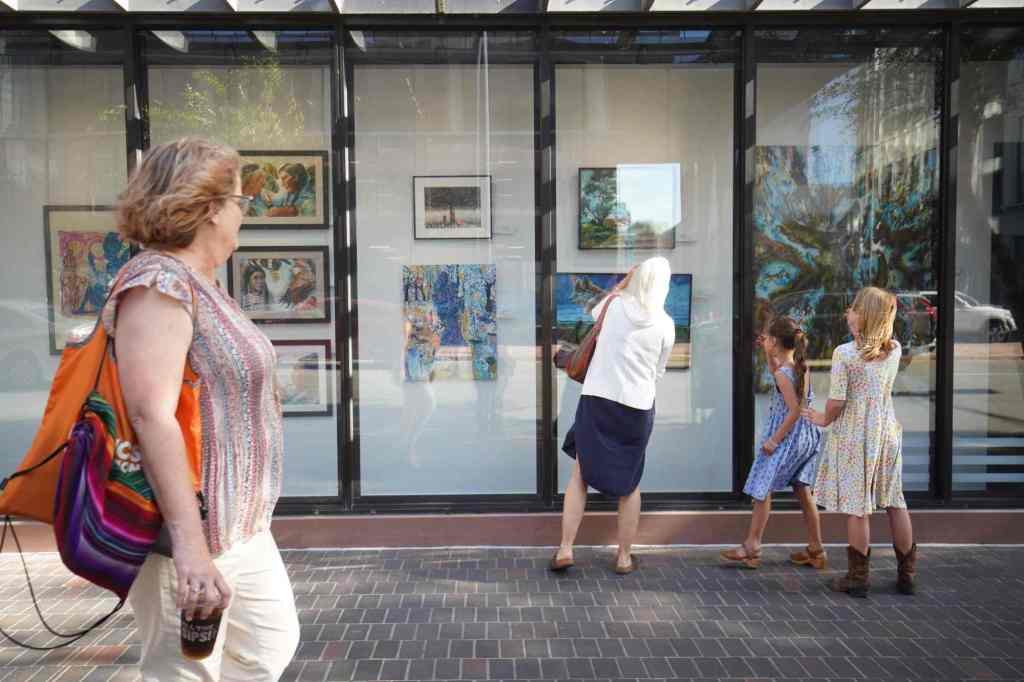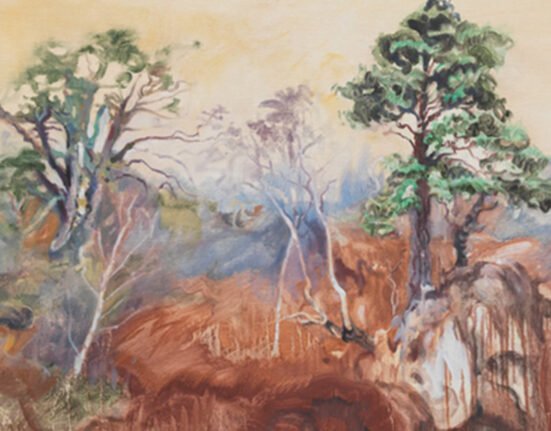One night last month after eating dinner in downtown San Diego, U.S. District Judge Dana Sabraw saw something outside the Edward J. Schwartz Courthouse that brought a smile to his face.
Pedestrians walking along Broadway were pausing to admire paintings that are part of The Courthouse Gallery, a public art exhibit installed earlier this year inside a series of windows along the first floor of the federal courthouse. Those windows, which look into a shallow hallway as part of a quirky bit of architecture, had sat mostly unadorned for decades.
“It was very unsightly,” Sabraw said during a June 25 reception for the artists whose pieces now hang there. “I thought it was an embarrassment to the court.”
U.S. District Judge Janis Sammartino was only slightly less critical than Sabraw, calling that block of Broadway before the art was installed “dull” and “unattractive.”

That’s why last year, several federal judges and other court personnel decided to create The Courthouse Gallery as part of the Learning Center of the Southern District of California, a public outreach effort by the local federal courts. The Learning Center’s mission is to “(build) confidence in American justice through education and understanding.”
The court solicited submissions from San Diego artists last year. “The Art of Freedom,” the gallery’s first exhibit, was installed in April, featuring paintings and mixed media pieces by 14 local artists. The gallery will rotate themes in the future, but Sabraw told the artists and others gathered at the reception last month that the first theme was chosen with purpose.
“This system of ours, this constitutional government, it only works … if (the judiciary) does two things,” Sabraw said. “One, is we ensure freedom, and two, is we ensure equality under the law for all. Two basic but fundamentally important things. And so this inaugural gallery is focused on the first — freedom.”

Nannette Farina, one of the artists whose work was chosen for the exhibit, is a former attorney who began making art as a way to rest and relax when she had a heavy litigation workload. She had little formal training beyond a single drawing class in college, but has made art into something of a second career.
She heard about The Courthouse Gallery’s solicitation for pieces through the San Diego Water Color Society, of which she is a member. She submitted an abstract piece titled “Blue Freedom.”
In an explanation about her painting that she prepared for the reception, Farina wrote: “As a retired San Diego attorney, freedom carries several meanings for me. Freedom to be able to practice law as a woman. Freedom to live in a nation governed by laws. Freedom from oppression that people in many other parts of the world do not enjoy.”
However, Farina’s painting that now hangs in the courthouse windows is about a different kind of freedom, she wrote.
“By this piece … I express freedom and elevation from everyday life that art and the creative process can provide,” Farina wrote. “With its celestial undertones, the feeling of this piece is, in essence, freedom from gravity itself.”
The submissions varied greatly, said Sammartino, who added that helping curate the exhibit “was the most fun job I’ve ever had.”
Some pieces depict freedom more literally than others, such as Robert Chisholm’s “Cost of Freedom,” which shows a soldier in uniform standing near a small American flag planted near his feet. The soldier holds a salute in a graveyard that evokes Fort Rosecrans National Cemetery.
Paintings by artists Cecilia Cresto and Laura Laslo also feature American flag motifs.

Other kinds of freedom are represented in the paintings. “Women Charging,” a series of three watercolors by artist Cathy Surgeoner Deibler, depicts female big-wave surfers. “Jackie and Shadow Over Snowy Pass,” by Stephen Gary, depicts a striking-but-potentially-vertigo-inducing scene of Big Bear’s famed bald eagle couple flying above a mountain.
Though the location and execution of The Courthouse Gallery is new, the federal complex in downtown has a long history of showcasing art. The Learning Center has even created an art walk to view 13 pieces spread throughout the John Rhoades Federal Judicial Center.
“Excalibur,” a massive sculpture by Beverly Pepper, has sat outside the Edward J. Schwartz Federal Building since 1976. Two pieces by the late San Diego installation artist Robert Irwin adorn the newer Carter Keep Courthouse, including a 33-foot polished obelisk in the lobby and a “living sculpture” made of hedges outside.
And on four floors of the Schwartz Courthouse, “Portraits of Justice” curated by local courtroom sketch artist Krentz Johnson showcases and teaches the history of courtroom sketch art.
“The Art of Freedom” exhibit will run until Aug. 21.







